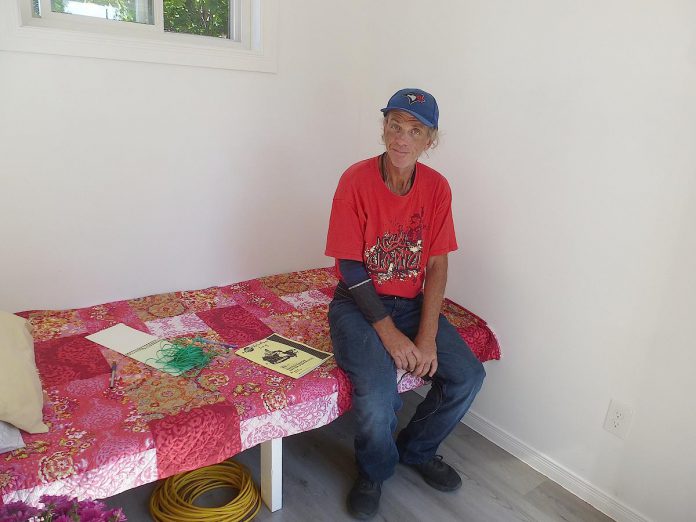
The Ontario Land Tribunal has dismissed an appeal by Peterborough Action for Tiny Homes (PATH) of Peterborough city council’s decision to deny the grassroots organization’s application for a temporary use by-law to build 24 sleeping cabins on Lansdowne Street for people experiencing homelessness.
“It is with sadness, heartbreak and disappointment that we received the decision of the Ontario Land Tribunal yesterday,” PATH stated in a media release issued on Thursday night (October 23). “The ruling denied our final appeal for temporary rezoning, determining that we will not be able to create a sleeping cabin community at our 385 Lansdowne Street East site.”
In March 2023, PATH entered into a three-year lease agreement with Habitat for Humanity Peterborough and Kawartha Region for the purpose of providing transitional shelter support at the Lansdowne Street site, the former Peterborough Humane Society property located east of Ashburnham Drive, which Habitat had purchased with the intention of later developing multi-unit affordable residential housing.
PATH then began the land use planning process that would eventually result in an application for a temporary use by-law for the site, which is currently zoned as commercial. That process culminated with a report from city staff that recommended the temporary use by-law be approved. The staff report was presented to Peterborough city council meeting as general committee on August 26, 2024.
That meeting became a referendum on the viability of PATH’s proposal itself, as well as the suitability of the proposed site, with council hearing from 10 delegations that included neighbouring businesses and residents who objected to the location of the proposed sleeping cabin community.
One of the delegations was Toromont Industries, a heavy machinery company that operates Toromont Cat and Battlefield Equipment Rentals to the south of 385 Lansdowne Street, which objected to the proposed location of the sleeping cabin community because it would be in close proximity to their operations in an industrial zone.
“That heavy machinery makes a lot of noise (and) spits out a lot of dust and emissions,” said Garnet Peirson, the company’s vice president of real estate and development, during the delegation. “If there are complaints to Ministry of the Environment about noise, Ministry of the Environment can come in and shut down our operations or they can severely alter our operations.”
Peirson said this is something the company has faced in Kanata when a residential development was located near their business as well as in Concord. Peirson also noted that Toromont is planning to expand directly behind 385 Lansdowne Street.
At the end of the meeting, city council voted 8-2 against accepting the application for the proposed use by-law, with only councillors Alex Bierk and Joy Lachica voting in favour.
In response to city council’s decision, PATH announced on October 3, 2024 that it had submitted an appeal to OLT, and subsequently began raising money to cover some of the legal costs for the appeal process.
After a case management conference in March 2025, during which Toromont Industries was added as an appellant, OLT held a video hearing from June 12 to 26 to review the appeal against the City of Peterborough’s decision.
While the city monitored the hearing, it did not take an active role and did not call any witnesses. Instead, representatives from Toromont Industries argued against PATH’s appeal, cross-examining the city’s director of planning, development and urban design Brad Appleby at one point during the hearing about the city staff recommendation.
On October 22, OLT issued its ruling to dismiss PATH’s appeal, concluding that the proposed use of the site would conflict with provincial land use compatibility policies because of its proximity to Toromont. The 19-page decision was written by Carolyn Molinari, who was reappointed to the tribunal in September 2024 for a three-year term. The Ajax resident is a member of the Ontario Professional Planners Institute with over 30 years experience as an urban planner.
The tribunal found that the proposed cabin community is a residential use and not an institutional or shelter-type use as PATH had argued, and is therefore considered a “dwelling” under provincial noise and land use compatibility rules. Because of this classification, the project would be located too close to an active industrial operation, creating land use compatibility conflicts that provincial policy seeks to avoid.
OLT determined the site is within the restricted 70-metre separation zone for sensitive land uses near industry, creating a risk of noise complaints and could limit Toromont’s operations or expansion. Even if mitigation such as fencing, air conditioning, or noise walls were added, the tribunal concluded, the risk to Toromont’s lawful operations and expansion could not be acceptably eliminated.
The tribunal’s decision heavily leaned on provincial land-use rules that prohibit new residential uses near industrial facilities without separation or transition zones, that protect employment lands from being constrained by neighbouring complaints, and that require avoidance first rather than mitigation — suggesting that PATH needs to find a more suitable site.
In its findings, OLT states four times that it “prefers the evidence” given during the hearing by Toromont experts over PATH’s experts.
OLT also gave “limited weight” to the city staff report supporting the application, noting that the staff recommendation presumed the sleeping cabins were classified as “noise sensitive institutional purpose buildings” rather than residential dwellings.
“Had the cabins been classified as dwellings, it remains uncertain whether the staff report would have reached the same conclusion,” the ruling states.
The tribunal also found that the proposed temporary use by-law application “does not meet the intent and policies” of the city’s official plan, adding that it “does not represent good land use planning and is not in the public interest.”
As for PATH, the organization expressed its dismay at the OLT decision and outlined the group’s activities while the appeal was underway.
“We believed in our community of sleeping cabins as a creative and meaningful part of the solution to the housing crisis in Peterborough,” PATH states. “We believed strongly in our appeal to the Ontario Land Tribunal. We fought hard, engaged experts, presented strong evidence, and did our due diligence.”
“While we waited for the OLT decision, we forged ahead. We looked at our community’s need and asked where we could help. We continued to develop strong partnerships with community agencies and we collaborated, shared capacity and resources, slowly moving the dial forward to support people through the local housing crisis. Over this time, we are proud to say that more of our unhoused neighbours had access to warm, sturdy winter clothing and survival essentials through our program and outreach partnerships.”
“Our Community Clothing Hub continues to hum as we receive, launder, sort and distribute hundreds of bags of clothing, blankets, sleeping bags and survival items to partner agencies in an effort to help our unhoused neighbours have some comfort and safety in extreme temperatures.”
“We continue to open our doors on Wednesdays through our PATHWay to Home initiative, that provides shelter from the elements, a warm shower and meal, snacks to take away and a fresh haircut and clothing-while at the same time helping folks feel the comfort of a caring community.”
“We work closely with our partner One City Peterborough to create much needed Additional Rental Units (ARUs) that provide permanent shelter and add to our city’s depleted transitional housing pool.”
As for its next steps given the OLT decision, PATH says “Our purpose is to help relieve poverty, and we will continue to work toward this goal,” noting that governments at all levels (federal, provincial, and municipal), social service organizations, and grassroots movements must come together to provide “meaningful solutions for our unhoused neighbours that involve a full range of pathways that honour a person’s choice and right to dignity.”
“We will take time to reflect on this by consulting with our partner agencies,” PATH states. “We will process this setback and ask ourselves what steps we will take going forward.”
PDF: Ontario Land Tribunal – Case number OLT-24-001038
Ontario Land Tribunal - Case number OLT-24-001038
This story has been updated to include a copy of the OLT’s ruling.

























